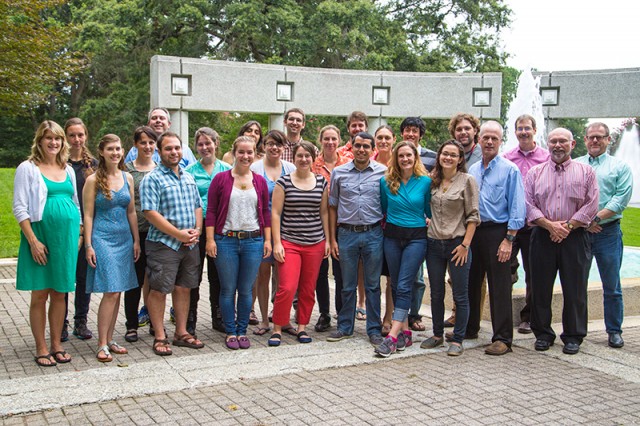Forty-five students from around the globe spent the last three weeks in classrooms at RENCI in Chapel Hill and at the National Center for Ecological Analysis and Synthesis (NCEAS) at the University of California, Santa Barbara, learning the software and technology skills needed for open, collaborative, and reproducible synthesis research.

Participants and instructors in the RENCI portion of the Open Science for Software course pose for a group photo on the final day of class.
The event was the Open Science for Synthesis (OSS) three-week workshop, held simultaneously on both coasts, with students and instructors at the two sites interacting using high-speed video collaboration tools. The workshop targeted early career scientists primarily in ecological, environmental and water science disciplines. According to Ray Idaszak, RENCI’s director of collaborative environments and lead coordinator of the RENCI portion of the workshop, the OSS workshop illustrates the value that a research institute can add to the educational offerings of a university.
“This course was an example of how a research institute can complement the educational infrastructure of a university,” Idaszak said. “It adds flexibility and deepens and enriches the educational experience for graduate students, post docs and early-career faculty. In the future, we hope the OSS can serve as a model for similar courses in other domains and that we can expand the participation and scope.”
Matt Jones, Director of Informatics Research and Development at NCEAS, said the multi-disciplinary course presents critical topics for early career ecological and environmental scientists that they aren’t getting through graduate education.
“Through OSS, we enrich participants understanding of data science, complementing their already strong subject area expertise and knowledge of statistics and analysis,” Jones said. “These skills in data management, software design and development for science, and collaborative synthesis should be taught throughout graduate schools around the country. OSS helps to fill that gap.”
The workshop weaved together several core themes using a mixture of instructive lectures, discussions, and exercises. These themes were reinforced—and injected into the real-time synthetic scientific research process—through daily work on group synthesis projects. Core themes included:
- Collaboration modes and technologies, virtual collaboration
- Data management, preservation, and sharing
- Data manipulation, integration, and exploration
- Scientific workflows and reproducible research
- Agile and sustainable software practices
- Data analysis and modeling
- Communicating results to broad communities
The last day of the course was devoted to student teams reporting on their synthesis research projects. Topics included marine populations dynamics, land use intensity and its relationship to ecosystems, the drought that has affected California, the dimensions of biodiversity, plant community dynamics and multi-scale eco-hydrology.
Open Science for Synthesis was sponsored by the Institute for Sustainable Earth and Environmental Software (ISEES) at NCEAS and the Water Science Software Institute (WSSI) at RENCI, two National Science Foundation projects that are developing concepts for institutes for sustainable scientific software. The workshop collaboration was born out of the shared mission of the two sustainable software institute conceptualization efforts and was modeled after NCEAS’ successful Summer Institute 2013.
For more information, see http://www.nceas.ucsb.edu/OSS.


